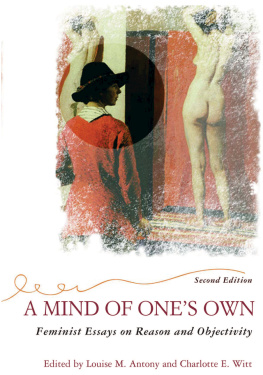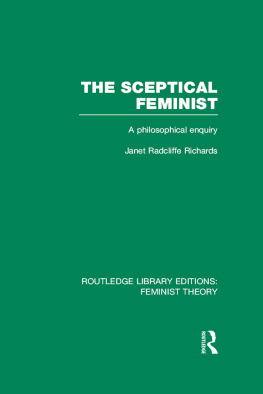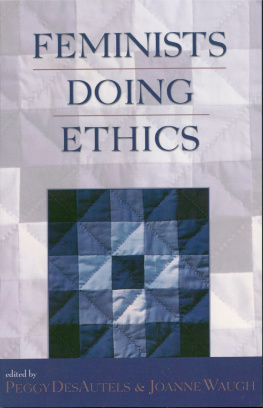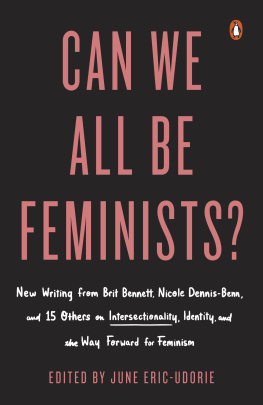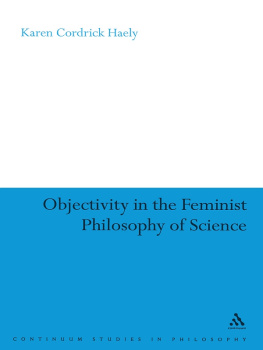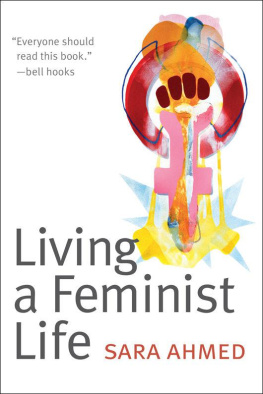A MIND OF ONE'S OWN
Feminist Theory and Politics
Virginia Held and Alison Jaggar ; Series Editors
A Mind of One's Own: Feminist Essays on Reason and Objectivity, Second Edition, edited by Louise M. Antony and Charlotte Witt
Rediscovering Women Philosophers; Philosophical Genre and the Boundaries of Philosophy, Catherine Villanueva Gardner
Globalizing Care: Ethics, Feminist Theory, and International Relations , Fiona Robinson
The Power of Feminist Theory, Amy Allen
The Feminist Standpoint Revisited and Other Essays, Nancy C.M, Hartsock
Feminists Rethink the Self, edited by Diana Tietjens Meyers
Revisioning the Political: Feminist Reconstructions of Traditional Concepts in Western Political Theory, edited by Nancy J. Hirschmann and Christine Di Stephano
Care, Autonomy, and Justice: Feminism and the Ethic of Care, Grace Clement
Second Edition
A Mind of One's Own
Feminist Essays on Reason and Objectivity
Edited by Louise M. Antony and Charlotte E. Witt
Feminist Theory and Politics
First published 2001 by Westview Press
Published 2018 by Routledge
711 Third Avenue, New York, NY 10017, USA
2 Park Square, Milton Park, Abingdon, Oxon OX14 4RN
Routledge is an imprint of the Taylor & Francis Group, an informa business
Copyright 2002 Taylor & Francis
All rights reserved. No part of this book may be reprinted or reproduced or utilised in any form or by any electronic, mechanical, or other means, now known or hereafter invented, including photocopying and recording, or in any information storage or retrieval system, without permission in writing from the publishers.
Notice:
Product or corporate names may be trademarks or registered trademarks, and are used only for identification and explanation without intent to infringe.
A CIP catalog record for this book is available from the Library of Congress.
ISBN 13: 978-0-8133-6607-4 (pbk)
ISBN 13: 978-0-8133-7937-1 (hbk)
To Virginia Witt C.W.
In memory of my mother, Elizabeth L. Antony L.M.A.
When we began thinking about a second edition of A Mind of One's Own, we were struck by the rapid development of feminist reflection on reason and objectivity over the past decade. While we acknowledged the impossibility of providing a comprehensive survey of the ways in which feminist philosophy has intersected with traditional philosophizing during that period, we felt that we could, nonetheless, give a good indication of the extent and nature of this fertile intermingling by supplementing the volume's original contents with new chapters that reflect some of the advances of the past decade. We were gratified by the original volume's reception, and we believe that this new edition will remain useful for feminist theorists, as well as for philosophers wanting to include feminist thought in their research or teaching.
The essays we have chosen for this second edition both enlarge the themes of the original articles and take the volume in new directions. In making our selections, we considered three points. First, we were interested in discussions that were consonant with the volume's main tocus: conceptions of reason and objectivity "credentialed" within mainstream philosophy but contested within feminism. Second, we sought topics that had application beyond the narrow confines of academic philosophy. Finally, we wanted to invite a new generation of feminist philosophers to reflect on the issues treated in the first edition. Of course there are numerous topics that fit our criteria, and many new voices in feminist philosophy, but we think that the papers we have chosen especially complement and enrich the original collection.
One topic that met all our desiderata is the topic of rational choice theory. It has a long philosophical history reaching back to the political theory of Thomas Hobbes and the economic thought of Adam Smith, but it is also precisely the sort of theory that many feminists have in mind when they deplore the androcentrism of philosophical theories of rationality. Moreover, it is a theory with broad implications for economics, law, and the social sciences. The chapters by Ann Cudd and Elizabeth Anderson, which grew out of a marvelously cooperative and productive debate between the two at a meeting of the Eastern Division of the American Philosophical Association meetings, concern the question of the androcentrism of "the rational agent" assumed by rational choice theory. Their nuanced assessments of the value of rational choice theory for feminism advances our understanding in several ways. Looking at the theory through the lens of feminism sheds new light on its presuppositions and limitations. Conversely, the attempt to treat feminist values and goals within the context of rational choice theory illuminates important questions for feminist thought, like the value of autonomy. These chapters can be read profitably in connection with Jean Hampton's similarly complex treatment of contractarianism in her contribution to the original collection.
Philosophical issues posed by global feminism and muiticulturalism seemed eminently appropriate for our volume, particularly those stemming from cultural practices that at least seem oppressive of women. Uma Narayan focuses on the practice of veiling in her discussion of custom, choice, and autonomy. While rejecting the idea of "group rights" or "cultural rights" adopted by some feminists and political theorists, Narayan advocates a position that recognizes the autonomy and respects the choices of many of the women who choose to participate in activities that appear repressive to many Western feminists. Her valuable contribution moves deftly between theory and practice and from culture to culture in developing a mode of understanding women unlike oneself that neither patronizes nor exoticizes. Its practical applications and real-world significance are obvious in a world where the processes of cultural globalization and cultural diversification are equally potent.
Karen Jones's essay also focuses on the issue of cultures in conflict and the challenge inherent in coming to understand and accept what may seem, from one's own perspective, to be literally unbelievable. Her case study is the asylum plea of Fauziya Kassindja, a young woman fleeing genital mutilation and forced marriage in her homeland, Togo. The U.S. Immigration judge in the case, Donald Ferlise, denied asylum on the grounds that Kassindja's story was "not credible." Jones manages to draw some useful lessons from this appalling case, developing a structure of guidelines for the evaluation of astonishing reports. In its practical orientation, its sensitivity to detail, and its feminist motivation, Jones's paper makes a useful contribution to both epistemology and feminism, and in this way seems a sterling example of the kind of "engaged" epistemological work that feminist epistemologists (including Louise Antony in her chapter in the original volume) have long been calling for. It connects clearly with feminist work on epistemic authority and the mechanisms by which some testimony is legitimated as knowledge while other testimony is dismissed as epistemically suspect. It makes a positive contribution to the feminist goal of developing more adequate, situated epistemic norms.
The work of Catharine MacKinnon on objectivity and its role in the construction and epistemology of gender remains a touchstone for feminist theory. Rachel Zuckert takes up MacKinnon's charge that objectivity, like other basic values of liberalism, codes for a male epistemological point of view and thereby contributes to the subordination of women. Zuckert argues that, ironically, MacKinnon's most persuasive criticisms of liberalism make use of the norm of objectivity in a way that is, in tact, congenial to liberal thought. This chapter can be usefully read alongside the contributions of Sally Haslanger and Elizabeth Rapaport, who also attempt to uncover MacKinnon's basic theoretical commitments and discuss the ways in which her conceptual apparatus intersects with traditional philosophical categories. The fruitfulness of this feminist engagement with foundational metaphysical issues confirms the conclusion drawn by Charlotte Witt in her first edition chapter that feminists should not and will not cease to do metaphysics.

